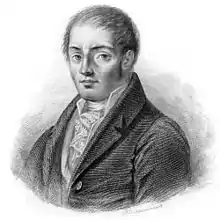Francesco Mario Pagano
Francesco Mario Pagano (8 December 1748 – 29 October 1799) was an Italian jurist, author, thinker, and the founder of the Neapolitan school of law.[1] He is regarded as one of the most influential Enlightenment thinkers.[2] A moderate reformist, he is seen as a forerunner of the Italian unification.[3]
Francesco Mario Pagano | |
|---|---|
 Francesco Mario Pagano | |
| Born | 8 December 1748 |
| Died | 29 October 1799 (aged 50) |
| Nationality | Kingdom of Naples |
| Other names | Mario Pagano |
| Alma mater | University of Naples Federico II |
| Occupations | |
| Years active | 1768–1799 |
| Notable work |
|
Biography
He was born in Brienza in the southern Province of Potenza. He studied at the University of Naples Federico II under Antonio Genovesi. At the age of twenty, he became special lecturer in moral philosophy there, at the same time practising law. He was friend of Gaetano Filangieri, entering the masonry with him, and was elected venerable master of the Neapolitan lodge "La philantropia". Pagano was one of the men who powerfully helped Italy in her social and scientific advancement and in the 1790s he had striven more than any other intellectual to give a political form to the 18th century reform tradition in southern Italy.[4]
His work Saggi politici (1783–85) provided a philosophical history of the Kingdom of Naples, arguing against torture and capital punishment and advocating more benign penal codes. Considerazioni sul processo criminale (Considerations on the criminal trial, 1787), gave him international popularity and was much praised by Le Moniteur Universel, the main newspaper of the revolutionary France.[5]
In 1794 he defended Vincenzo Galiani, Vincenzo Vitaliani and Emanuele De Deo – three alleged conspirators against Ferdinand IV; after they were sentenced to death, Pagano was deprived of his professorship, arrested, imprisoned and expelled from the kingdom.[6] After fleeing Naples in 1796, he returned in 1799 and drafted the constitution of the short-lived Neapolitan Republic. The document bore similarities to the French Constitution of 1793 but presented original traits such as the institution of the "body of ephors", an authority who would have overseen the maintenance of the law. It is considered the precursor of the modern constitutional court.[7]
After the fall of the republic, Pagano was arrested and imprisoned in the Castel Nuovo. He was executed by hanging at the "Piazza del Mercato" in Naples, along with other revolutionaries: Domenico Cirillo, Giorgio Pigliacelli and Ignazio Ciaia.
Pagano's other juridical or philosophical works included Progetto di Costituzione della Repubblica napoletana, Sul processo criminale, Esame politico dell’intera legislazione romana, and Discorso sull’origine e natura della poesia. He also translated works from Greek and Latin, and wrote six tragedies (Gerbino, Agamennone, Corradino, Gli esuli tebani, Prometeo, and Teodosio) and one comedy (Emilia).
Notes
- The Cambridge History of Eighteenth-Century Political Thought, ed. Goldie & Wokler, 2006, p. 765
- Fulvio Tessitore, Comprensione storica e cultura, Guida, 1979, p. 27
- Roland Sarti, Italy: A Reference Guide from the Renaissance to the Present, Infobase Publishing, 2009, p. 457
- Girolamo Imbruglia, Naples in the Eighteenth Century, Cambridge University Press, 2007, p. 168
- Biancamaria Fontana, The Invention of the Modern Republic, Cambridge University Press, 2007, p. 140
- Francesco Mario Pagano (1748-1799) Archived 25 February 2008 at the Wayback Machine
- Maria Rosa Di Simone, Istituzioni e fonti normative in Italia dall'Antico Regime al fascismo, p. 111, Giappichelli, Torino, 2007.
References
- Nico Perrone. La Loggia della Philantropia. Un religioso danese a Napoli prima della rivoluzione. Palermo: Sellerio publ., 2006. ISBN 88-389-2141-5.
 This article incorporates text from a publication now in the public domain: Herbermann, Charles, ed. (1913). "Mario Pagano". Catholic Encyclopedia. New York: Robert Appleton Company.
This article incorporates text from a publication now in the public domain: Herbermann, Charles, ed. (1913). "Mario Pagano". Catholic Encyclopedia. New York: Robert Appleton Company.
External links
 Media related to Francesco Mario Pagano at Wikimedia Commons
Media related to Francesco Mario Pagano at Wikimedia Commons Quotations related to Francesco Mario Pagano at Wikiquote
Quotations related to Francesco Mario Pagano at Wikiquote